21 Weeks Pregnant Symptoms: Week 21 Of Pregnancy And Prenatal Care
21 weeks pregnant symptoms include quickening, weight gain, increased appetite, belly pain, and back pain. Other 21 weeks pregnancy symptoms are forgetfulness, Braxton-Hicks contractions, and frequent micturition.
21 weeks pregnant is when you have entered the second half of your pregnancy. Week 21 of pregnancy marks the week when the amniotic fluid level increases the fastest by 60 mL (milliliters) per week, according to a 2001 study, “ Sonographic assessment of amniotic fluid volume between 11 and 24 weeks of gestation: construction of reference intervals related to gestational age,” by Gramellini, Dandolo et al., at the Institute of Obstetrics and Gynaecology of University of Parma in Italy, published in Ultrasound in Obstetrics and Gynecology: The Official Journal of the International Society of Ultrasound in Obstetrics and Gynecology.
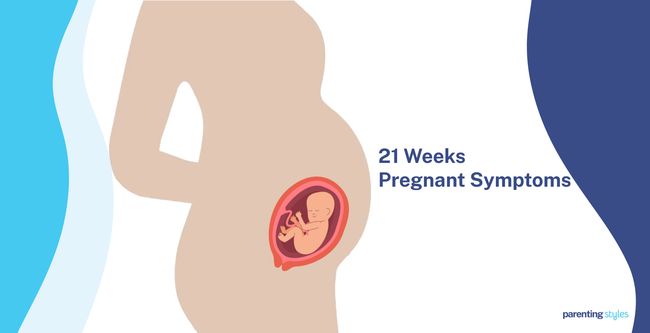
21-week pregnant mothers experience symptoms including body aches, stretch marks, increased appetite, and increased quickening (fetal movement). Pregnancy brain (forgetfulness or baby brain) is frequently reported, according to a 2018 study, “Cognitive impairment during pregnancy: a meta-analysis,” conducted by Helen Skouteris et al. at Deakin University and published in the Medical Journal of Australia (MJA). Prenatal care tips include GY-GYN visits, an ultrasound anatomy scan, and a glucose screening test.
What is 21 weeks pregnant in months? 21 weeks pregnant is 5 months and 1 week within the second trimester of pregnancy. You are in the first week of the sixth month of pregnancy.
What are the Pregnancy Symptoms During Week 21?
21 weeks pregnant symptoms include quickening, weight gain, increased appetite, belly pain, back pain, forgetfulness, Braxton-Hicks contractions, and frequent micturition. Below are common 21 weeks pregnancy symptoms.
- Fetal Movement: You increasingly feel your baby move, often resembling a rolling sensation.
- Weight Gain: Expect to gain about a pound per week, which is essential for your baby’s growth.
- Increased Appetite: It’s normal to feel hungrier and consume more calories in pregnancy at this stage.
- Round Ligament Pain: Discomfort around the lower belly due to stretching ligaments is common.
- Back Pain: Weight changes and shifting center of gravity cause back pain in pregnancy.
- Forgetfulness: You have the “pregnancy brain” or “baby brain” and tend to forget things.
- Braxton Hicks Contractions: Practice contractions that are usually mild and irregular.
- Frequent Urination: The growing uterus puts pressure on your bladder, leading to more frequent bathroom trips.
Every individual experiences different levels of these symptoms during their pregnancy. Consult your obstetrician if you have any concerns or questions.
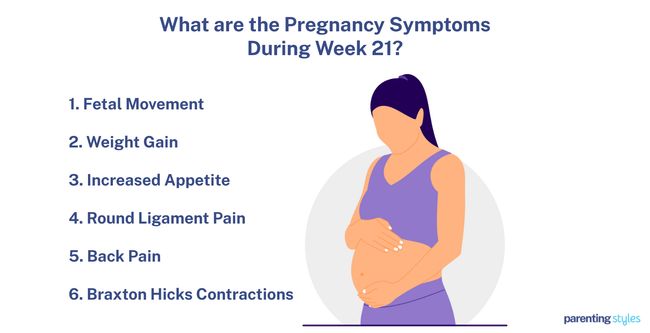
What is the Importance of Understanding Being 21 Weeks Pregnant?
The importance of being 21 weeks pregnant is understanding that the amniotic fluid volume increases the fastest this week. The week-21 fetus matures and grows rapidly. Your baby now weighs around 1 pound, sleeps 12 to 14 hours daily, has more control over limb movements, and gets a stronger heartbeat. They hear sounds from outside the womb and develop essential skills, including sucking and breathing.
The 21-week-old fetus is very active. The expectant mother feels more quickening (fetal movement).
The fetal anatomy scan typically occurs around week 21 to provide detailed images that help monitor your baby’s growth patterns and detect potential abnormalities.
Increased appetite is common as the mother’s body supports the growing fetus. A balanced intake of nutrients is important throughout pregnancy to ensure optimal health for both mother and child.
Braxton Hicks contractions (or “practice” contractions) sometimes occur as part of normal body changes preparing for labor later on.
Stress management is vital during pregnancy, impacting overall well-being. Understanding all aspects of being 21 weeks pregnant, as outlined in pregnancy week by week, empowers informed decisions about prenatal care. This includes maintaining regular check-ups and discussing concerns with healthcare providers. Managing anxieties through relaxation techniques like deep breathing and meditation helps better emotional preparation.
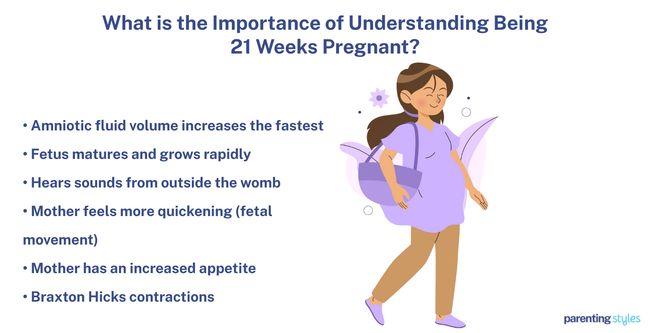
What to Expect at 21 Weeks Pregnant?
A 21-week pregnant mother should expect a growing belly, increased appetite, and quickening. You are officially halfway through your pregnancy. Your uterus is now about level with your belly button (umbilicus), according to a 2023 India study, “Acute Abdomen in Pregnancy: A Comprehensive Review of Diagnosis and Management,” by Rishi Dhamecha et al., at of Obstetrics and Gynecology, Jawaharlal Nehru Medical College, published in Cureus.
You find yourself feeling hungry often. You feel quickening or fluttering more often as your baby has more control over limb movements. Braxton Hicks contractions start for some women. These “practice” contractions are usually irregular and painless. Common second-trimester symptoms include heartburn, indigestion, constipation, leg cramps, and forgetfulness. You tend to have more energy during the second trimester. Mood swings happen due to fluctuating hormones.
How is the Baby Developing at 21 Weeks Pregnant?
Your 21-week-old baby is about the size of a carrot. Your fetus now swallows amniotic fluid, and their digestive system accumulates meconium, the earliest stool, in the rectum and colon at week 21, according to a 2015 study, “Meconium in Perinatal Imaging: Associations and Clinical Significance,” by Beverley Newman et al. at Stanford University, published in Seminars in Ultrasound, CT and MRI.
A week 21 fetus has developed sleep-wake cycles that show periods of more or less movement depending on whether it’s active or resting. This is detailed in a 2017 study, “Sleep Disturbances in Newborns,” by Daphna Yasova Barbeau and Michael D. Weiss at the University of Florida, published in Children.
The baby’s heart triples in size between the 12th and 21st week, according to a 2013 study, “Sonographic markers for early diagnosis of fetal malformations,” by Gian Carlo Di Renzo et al., published in the World Journal of Radiology.
The 21-week fetus steadily gains fat to keep warm. Their skin thickens and becomes less transparent. Movements are more pronounced, and the mother feels more kicks, punches, and rolls in week 21. Your 21-week-old baby hears sounds from both inside and outside your womb.
How Big is Your Baby at Week 21 of Pregnancy?
The 21-week-old baby is about the size of a carrot. The 50th percentile measurements for 21-week fetal growth are as follows: the biparietal diameter (BPD) is 50 millimeters, the head circumference (HC) is 186 millimeters, the abdominal circumference (AC) is 162millimeters, the femur length (FL) is 35 millimeters, and the humerus length (HL) is 34 millimeters. The 21-week-old fetus weighs 398 grams (14.04 ounces or 0.88 pounds), according to the 2017 World Health Organization Fetal Growth Charts published in PLoS Medicine.
What are the Key Developmental Milestones of Babies at Week 21 of Pregnancy?
The key developmental milestones of babies at week 21 of pregnancy include more quickening, lanugo coverage, and vernix caseosa development. Here are 5 developmental milestones of fetuses at week 21 of pregnancy.
- Fetal Movement (Quickening): Limb movements are coordinated and frequent, with more control over limb movements. You start feeling fluttering or kicking as your baby has rapid eye movements.
- Lanugo Coverage: Your baby’s whole body is covered in a light coat of peach fuzz hair known as lanugo, which helps protect their skin.
- Vernix Caseosa Development: A waxy substance called vernix caseosa forms on the baby’s skin for protection during the remainder of pregnancy.
- Swallowing Amniotic Fluid: The baby practices swallowing amniotic fluid regularly, aiding in the development of their digestive system and preparing them for sucking and breathing after birth.
- Developing Digestive System: As part of this practice, your unborn baby reacts to certain foods you eat since they taste flavors through the amniotic fluid.
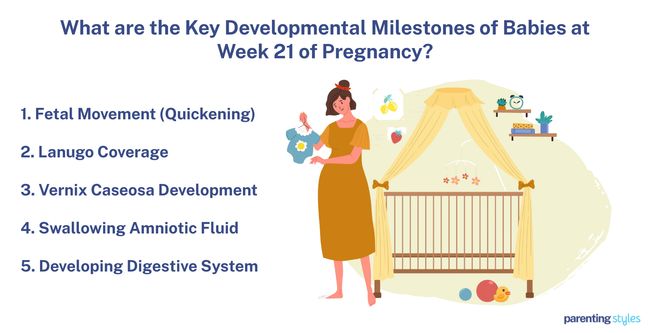
How to Know if Your Baby is Healthy During Week 21 of Pregnancy?
Here are 3 ways to know if your baby is healthy during week 21 of pregnancy.
- Fetal Movement: Feeling your baby move is a reassuring sign of their well-being. Trust your perception of what’s normal for your baby. According to a 2008 study, “Fetal Movement Assessment” by J. Frederik Frøen and Vicki Flenady, published in Seminars in Perinatology, your subjective sense of your baby’s movements is crucial. If you notice a decrease in activity, contact your obstetrician immediately.
- Prenatal Checkups: Regular visits to your OB-GYN are essential for monitoring your health and your baby’s development. During these appointments, your doctor will measure your belly to check for proper growth, listen to your baby’s heartbeat, and address any concerns you have.
- Ultrasound and Screening Tests: Between 18 and 22 weeks, a level 2 ultrasound and other screenings are typically performed. These tests allow your healthcare provider to examine your baby’s organs, limbs, and overall growth and to detect potential developmental abnormalities.
Every pregnancy is unique. It’s essential to communicate with your doctor if you have concerns about your baby’s well-being. If you notice a decrease in fetal activity, notify your OB-GYN immediately.
Does Fetal Movement Increase at 21 Weeks Pregnant?
Yes, fetal movement increases at 21 weeks pregnant. Your baby grows rapidly and moves frequently in the amniotic sac. Quickening (fetal movement) is felt with more frequency and intensity. Here are the 4 key types of movements found at 21 weeks pregnant.
- Developing Muscles: The fetus’s muscles strengthen daily, allowing for more purposeful movements like kicks, punches, and rolls.
- Practicing Reflexes: Your baby practices necessary reflexes such as sucking and swallowing.
- Responding to Stimuli: The fetus responds to sound, rhythm, and melody. You notice little movements inside your belly when you speak or play music.
- Hiccups: It’s common for your baby to have hiccups due to developing diaphragm muscles.
Every pregnancy experience varies. Some fetuses naturally move more than others. If you are concerned about fetal activity levels, don’t hesitate to consult your OB-GYN.
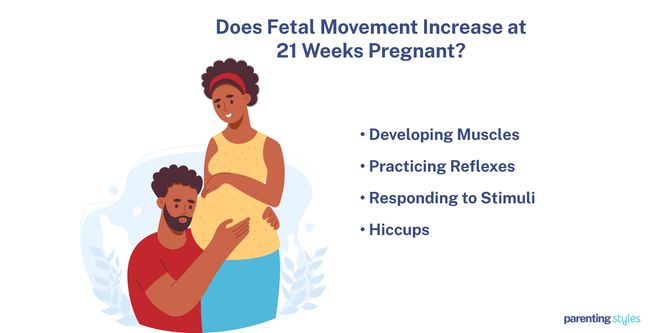
How is Your Baby Positioned at 21 Weeks Pregnant?
Your baby is likely positioned in a head-up (non-vertex) position at 21 weeks pregnant because 57% of fetuses are found in various nonvertex positions in a 2008 study, “Natural History of Fetal Position During Pregnancy and Risk of Nonvertex Delivery,” by Catherine Takacs Witkop et al. at the Johns Hopkins Bloomberg School of Public Health, published in Obstetrics & Gynecology. Non-vertex positions include breech (bottom-first), transverse (sideways), and variable presentations that are not vertex (head-down).
However, a baby’s position is not fixed. The baby likely changes positions multiple times before delivery. Research shows that 10% of fetuses are in nonvertex positions by week 31-35 of gestation.
Can Your Baby Taste What You Eat at 21 Weeks Pregnant?
Yes, your baby can taste what you eat at 21 weeks pregnant through the amniotic fluid. A 2015 study, “Impacts of In Utero and Early Infant Taste Experiences on Later Taste Acceptance: A Systematic Review,” led by Eva A. Rehfuess at Ludwig-Maximilians-University in Munich, Germany, and published in The Journal of Nutrition, supports this.
Fetal taste receptors mature around the 17th week of pregnancy, with fetal swallowing beginning around the 12th week and suckling starting by the 18th week, according to a 2018 study titled “The Evolution of Taste and Perinatal Programming of Taste Preferences,” conducted by Podzimek, Š. et al. at the General University Hospital in the Czech Republic and published in Physiol Res 67. This fetal development allows your baby to experience different tastes by the 21st week.
What Are The Changes In The Mother’s Body At 21 Weeks Pregnant?
Weight gain, baby bump appearance, and posture are the changes in the mother’s body at 21 weeks pregnant. Here are the 7 key changes in the mother’s body in week 21.
- Weight Gain: Mom’s appetite increases, causing healthy weight gain to support fetal growth.
- Uterus Size: The expanding uterus makes the baby bump more noticeable
- Posture: The center of gravity shifts anteriorly due to the increased and altered mass distribution in the trunk. Some women change to a sway-back posture to maintain balance and stability, according to a 2012 Japan study, “Spinal curvature and characteristics of postural change in pregnant women,” by Okanishi, Natsuko et al. at the Hiroshima International University, published in Acta Obstetricia et Gynecologica Scandinavica.
- Baby Movement (Quickening): You tend to feel more frequent baby movements as they have more control over limb movements but are still small enough to change position a lot.
- Skin Changes: Due to hormonal fluctuations, you experience skin changes like pigmentation variations, stretch marks, or even varicose veins. Some women notice bleeding gums.
- Tiredness and Sleeping Problems: Sleeping issues become increasingly common due to physical discomforts such as heartburn and indigestion.
- Growing Belly and Breasts: Both continue to expand significantly during this trimester.
- Braxton Hicks Contractions: Irregular, painless uterine tightenings that prepare the body for labor start being felt around this time.
Every pregnancy differs. Consult your OB-GYN for concerns about body changes or the baby’s development.
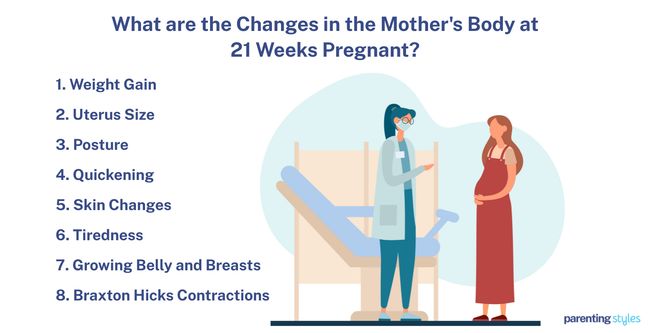
How Big Is A 21 Weeks Pregnant Belly?
A 21-week pregnant belly is around 21 centimeters in fundal height (distance from your pubic bone to the top of your uterus). However, research shows that the belly size varies significantly from woman to woman. Factors affecting the belly size or weight gain include parity (number of pregnancies), body mass index (BMI), smoking, and blood pressure, according to a 2022 study, “Pregnancy: Learn More – Weight gain in pregnancy,” by Dawes, M. G. and J. G. Grudzinskas, published in BJOG: An International Journal of Obstetrics & Gynaecology.
Women who had been pregnant before (multigravid) had a lower average weekly weight gain than women who were pregnant for the first time (primigravid). This difference becomes more apparent from week 37 of the pregnancy onwards.
Women with a higher BMI at the start of pregnancy had a lower average weekly weight gain. Specifically, women in the highest BMI quartile (>26) had lower average weekly weight gain than those in the lower quartiles.
Women who smoked during pregnancy had a lower average weekly weight gain than non-smokers.
Women who experienced hypertension (high blood pressure) during pregnancy had a higher average weekly weight gain compared to women with normal blood pressure. This difference becomes more noticeable later, from weeks 28 to 40 of pregnancy.
Your 21-week baby is about the size of a carrot. The amniotic fluid surrounding your baby and the developing placenta significantly contribute to your belly’s growth. This fluid provides essential cushioning for your baby’s movements and supports overall nutrition needs throughout mid-pregnancy.
Research has found that the size of your belly does not necessarily indicate the mother’s health or the baby’s development.
Can You Feel Contractions as Early as 21 Weeks Pregnant?
Yes, you can feel contractions as early as 21 weeks pregnant. These tight feelings in your womb in week 21 are Braxton Hicks contractions or signs of preterm labor.
Braxton Hicks are “practice contractions” that are generally painless and sporadic, often described as a tightening sensation. Braxton Hicks contractions usually start in the second trimester and help prepare your uterus for labor. These contractions come and go without leading to actual labor.
However, experiencing regular, painful contractions at 21 weeks is not normal and sometimes indicates preterm labor. Preterm labor refers to the onset of actual labor before 37 weeks of pregnancy. If you’re having consistent pain or more intense symptoms, contact your OB-GYN immediately, as this signifies premature labor rather than just Braxton Hicks.
It’s important to consult an obstetric care professional if you have any concerns or questions to obtain appropriate care based on an accurate assessment and ensure your safety and that of your baby.
What are the Tips for Prenatal Care During Week 21?
Attending your regular antenatal appointments, performing a level 2 ultrasound or reviewing the ultrasound results are important prenatal care during week 21 of pregnancy.
To manage stress, practice relaxation techniques such as deep breathing exercises or meditation. Communicating your feelings with loved ones or therapists helps you prepare emotionally for the changes ahead.
What Types of Foods are Beneficial to Eat During Week 21 of Pregnancy?
15 types of foods are beneficial to eat during week 21 of pregnancy, according to the American College of Obstetricians and Gynecologists (ACOG).
- Sardines, cheese, dark green leafy vegetables (Calcium: Builds strong bones and teeth)
- Lean red meat, iron-fortified cereals, prune juice (Iron: Makes red blood cells and helps deliver oxygen to your fetus)
- Iodized table salt, dairy products, seafood (Iodine: Essential for healthy brain development)
- Peanuts, eggs, beef liver (Choline: Important for developing your fetus’s brain and spinal cord)
- Green leafy vegetables, carrots, sweet potatoes (Vitamin A: Helps form red blood cells and helps the body use protein, fat, and carbohydrates)
- Strawberries, tomatoes, broccoli (Vitamin C: Promotes healthy gums, teeth, and bones)
- Fatty fish such as salmon and sardines, fortified milk, and sunlight (Vitamin D: Builds bones and teeth and helps promote healthy eyesight and skin)
- Bananas, whole-grain cereals, pork (Vitamin B6: Helps form red blood cells and helps the body use protein, fat, and carbohydrates)
- Fish, poultry, meat (Vitamin B12: Maintains the nervous system and helps form red blood cells)
- Fortified cereal, enriched bread, and pasta, dark green leafy vegetables (Folic Acid: Helps prevent birth defects of the brain and spine and supports the general growth and development of the fetus and placenta)
- Brown rice, oats, quinoa (Grains: Sources of folic acid, fiber, iron, and B vitamins)
- Fresh, canned, frozen, or dried fruit (Fruits: Sources of vitamins and minerals, antioxidants, and fiber)
- Raw, canned, frozen, dried vegetables, or 100 percent vegetable juice (Vegetables: Sources of calcium, vitamin D, and protein)
- Beans, seafood, processed soy products (Protein: Sources of protein, iron, zinc, and omega-3 fatty acids)
- Yogurt, pasteurized milk, cheese (Dairy: Sources of calcium, vitamin D, and protein)
What can Happen if You Eat Unhealthy Food?
If you consistently eat unhealthy foods during pregnancy, your health will be affected negatively through unhealthy weight gain, nutritional deficiencies, and digestive problems. Your baby’s organ development, preterm birth risk, and future health is negatively impacted.
The following 7 negative impacts can happen if you eat unhealthy foods consistently during pregnancy and week 21.
- Excessive Weight Gain: Unhealthy eating leads to significant weight increases during pregnancy, which increases gestational diabetes risks.
- Nutritional Deficiencies: Lack of essential nutrients affects energy levels and overall function.
- Digestive Problems: Junk food worsens common pregnancy-related digestion issues.
- Long-term Health Risks: Increases future chances of chronic conditions like type 2 diabetes, heart disease, cancers, high blood pressure, and sleep problems.
- Growth and Development Issues: Improper nutrition impacts organ development.
- Future Health Problems: Children tend to develop obesity or related illnesses later due to maternal diet patterns.
- Premature Birth Risk: Poor eating is sometimes linked with preterm labor incidents.
While occasional indulgences are normal, focusing on nutrient-rich foods ensures better outcomes for both the mother’s health and the baby’s development. Consult a nutritionist or OB-GYN if unsure about specific dietary needs during the twenty-first week of pregnancy.
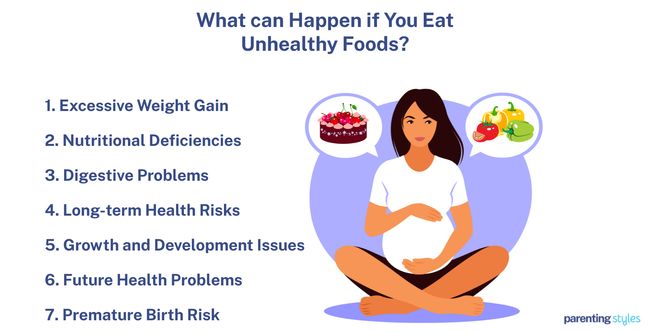
What Exercises Can You Do during Week 21 of Pregnancy?
You can walk, run, swim, bike, and stretch during week 21 of pregnancy to maintain health and fitness, as recommended by the 2020 World Health Organization (WHO) Guidelines on Physical Activity and Sedentary Behaviour.
Here are six exercises suitable for week 21 of pregnancy:
- Walking
- Running
- Swimming
- Stationary Bicycling
- Stretching
- Pelvic Floor Muscle Training
These activities provide numerous benefits: aerobic exercises enhance cardiovascular fitness, muscle-strengthening exercises improve muscular strength, and daily pelvic floor exercises help reduce the risk of urinary incontinence.
Aim for at least 150 minutes of moderate-intensity aerobic and muscle-strengthening exercises weekly for optimal health benefits. Moderate-intensity activity is typically felt as a 5 or 6 on a scale of 0 to 10, where 0 is rest, and 10 is maximum effort.
If you haven’t been active, start with small amounts of physical activity and gradually increase the frequency, intensity, and duration. Even minor amounts of physical activity benefit your health and your baby’s development.
It’s important to avoid physical activity in extreme heat and high humidity. Always stay hydrated by drinking water before, during, and after exercise. Avoid activities with a high risk of falling, those that involve physical contact, or those that limit oxygenation, such as high-altitude activities if you are not accustomed to such environments.
What are the Things to Avoid at 21 Weeks Pregnant?
The 21 things to avoid at 21 weeks pregnant are the following.
- Alcohol: Refrain from consuming alcohol during pregnancy, as it causes severe developmental issues and birth defects, such as fetal alcohol spectrum disorders (FASD). Even minimal alcohol intake negatively affects your baby’s cognitive and behavioral development, as highlighted in the 2020 study “Alcohol Use in Pregnancy” by Oregon Health and Science University and Oregon State University, published in Clinical Obstetrics and Gynecology.
- Smoking and Secondhand Smoke: Avoid smoking and exposure to secondhand smoke. Smoking increases the risks of miscarriage, premature birth, and low birth weight, according to the 2020 study “Exposure to Tobacco, Environmental Tobacco Smoke and Nicotine in Pregnancy: A Pragmatic Overview” by Gillian S. Gould and colleagues, published in the International Journal of Environmental Research and Public Health. Seek assistance to quit smoking if necessary.
- Recreational Drugs: Avoid using recreational drugs, as they cause various health problems for your developing baby.
- Cannabis: Like other recreational drugs, cannabis use during pregnancy leads to low birth weight and developmental delays.
- Caffeine: Limit your caffeine intake to 200mg daily to reduce the risk of miscarriage and low birth weight. While moderate caffeine consumption is generally safe, excessive intake is harmful.
- Certain Medications and Supplements: Consult your doctor before taking any medications, supplements, or herbal remedies, as some are harmful during pregnancy.
- High Mercury Fish: Limit consumption of mercury-rich fish, such as swordfish, king mackerel, tilefish, and shark.
- Undercooked or Raw Meat: Avoid eating undercooked or raw meat to prevent foodborne illnesses.
- Unwashed Vegetables and Fruits: Wash all vegetables and fruits thoroughly to avoid toxoplasmosis.
- Deli Meats: Only eat deli meats that have been thoroughly heated to avoid harmful bacteria.
- Unpasteurized Foods: Avoid unpasteurized dairy products, soft cheeses (like brie and feta), and raw or undercooked meat, fish, and eggs to avoid bacterial infections.
- Bagged Salads: Avoid pre-packaged salads, as they often harbor harmful bacteria.
- Iron Supplements: Only take iron supplements if prescribed by your doctor.
- Extreme Diets: Avoid rapid weight loss or highly restrictive diets, as they disrupt hormone levels and ovulation.
- Excessive Exercise: While moderate exercise is beneficial, avoid excessive or intense physical activity as it negatively impacts hormone balance and ovulation.
- Strenuous Activities or Contact Sports: Avoid activities with a high risk of falling, abdominal trauma, or heavy lifting.
- Exposure to Chemicals and Toxins: Avoid harmful chemicals in household cleaners and pesticides.
- Hot Tubs and Saunas: Avoid hot tubs and saunas, as high temperatures harm your developing baby.
- Gardening: Wear gloves while gardening to avoid contact with contaminated soil.
- Cat Litter: Practice good hygiene when handling cat litter. Wear gloves and wash hands thoroughly to prevent toxoplasmosis, especially if you have outdoor cats.
- Stress: Minimize stress and find healthy ways to manage it.
- Hair Dye: Avoid using hair dye, especially during the first trimester, due to potential chemical exposure risks. A 2018 study titled “The effect of pre-pregnancy hair dye exposure on infant birth weight: a nested case-control study” in China, published in BMC Pregnancy and Childbirth, notes that irregular menstruation or hair dye use before pregnancy increases the risk of low birth weight. While there’s no definitive evidence of harm, consult your doctor, consider delaying hair dyeing, or opt for natural alternatives if concerned.
By avoiding these substances and activities and following your healthcare provider’s guidance, you ensure a healthy and safe pregnancy. Always consult your healthcare provider for personalized advice and guidance on things to avoid at 21 weeks pregnant.
Is it Healthy to Acknowledge Your Anxiety at 21 Weeks Pregnant?
Yes, it is healthy to acknowledge your anxiety at 21 weeks pregnant.
It’s very normal to feel more anxious than usual during pregnancy. Acknowledging this anxiety is helpful. Ignoring it does not make it go away. Addressing it allows you to find coping mechanisms. However, don’t stress over your stress. Instead, understand the causes of your anxiety to manage them effectively.
Talking about your feelings with your OB-GYN, healthcare provider, partner, or loved ones creates open communication that provides emotional support. If necessary, seek professional help from a therapist specializing in prenatal care. Taking care of both mind and body ensures safety for you and the baby’s health throughout pregnancy.
How does Anxiety Affect You and Your Baby?
Your body is working hard to nurture your growing baby at 21 weeks pregnant. Experiencing some anxiety is normal. However, persistent or severe anxiety impacts both you and your baby physically and emotionally.
Anxiety causes fatigue, difficulty sleeping, muscle tension, and digestive issues physically. These symptoms are difficult to manage on top of the regular physical changes of pregnancy.
Anxiety makes it harder to enjoy your pregnancy. Untreated anxiety leads to feelings such as constant worry and overwhelm. Anxiety makes it difficult to feel connected (bonded) with the baby during pregnancy and after delivery.
Consistently high anxiety levels are linked to poor obstetric outcomes, including premature birth, low birth weight, impact on fetal development, and neurobehavioral issues after birth.
Severe and prolonged stress has been associated with an increased risk of preterm birth, according to a 2015 study, “The effects of maternal depression, anxiety, and perceived stress during pregnancy on preterm birth: A systematic review,” by Anja Wittkowski et al., published in Women and Birth.
High maternal cortisol levels due to stress during pregnancy contribute to low birth weight in babies. Other hormones like adrenaline released by chronic maternal stress pass through the placenta, potentially impacting fetal growth trajectories.
If expecting mothers experience significant distress, seek professional support immediately to discuss treatment options tailored to their individual needs.
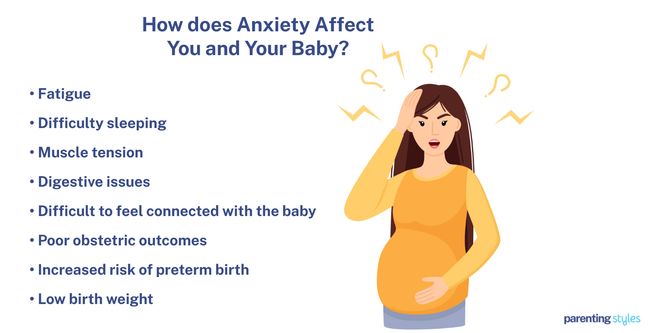
What are the Possible Complications that Can Happen at 21 Weeks Pregnant?
- Preterm Labor
- Risk Factors: Previous preterm birth, multiple pregnancies, infections.
- Signs: Regular contractions, pelvic pressure, low back pain, watery discharge.
- Solution: Seek immediate medical attention.
- Premature Rupture of Membranes (PROM)
- Risk Factors: Infections, previous PROM.
- Signs: Gush or trickle of fluid from the vagina.
- Solution: Contact your OB-GYN immediately for evaluation and management.
- Preeclampsia
- Risk Factors: First pregnancy, history of high blood pressure, obesity.
- Signs: Severe headaches, vision changes, upper abdominal pain, and swelling in the face and hands. If symptoms are present, immediate medical attention is required.
- Gestational DiabetesRisk factors: Obesity Symptoms include excessive thirst and frequent urination; screening often occurs around this time with a glucose tolerance test to diagnose it accurately
- Placenta Previa: This condition involves covering part/all cervix by the placenta, leading to painless bleeding requiring careful monitoring
Complications are not the norm. Consult your OB-GYN or obstetric care provider if you have concerns or questions.
How can a Partner Support the Mother at 21 Weeks Pregnant?
A partner can support the mother at 21 weeks pregnant in 10 ways.
- Listen Actively: Listen to her concerns, fears, and joys without judgment.
- Show Empathy: Understand that pregnancy often brings a mix of emotions due to hormonal changes and the anticipation of the baby.
- Reassurance: Offer reassurance and comfort, especially if she is anxious about the changes in her body and the upcoming birth.
- Attend Appointments: Accompany her to prenatal appointments to show your involvement and support.
- Help with Household Chores: Take on more household responsibilities to ease her physical load.
- Create a Comfortable Environment: Help her set up a comfortable space for rest.
- Encourage Rest: Encourage her to rest when needed and help create a relaxing bedtime routine.
- Exercise Together: If she feels up to it, engage in light exercises like walking or prenatal yoga. Staying active is beneficial.
- Nursery Setup: Start setting up the nursery together, a fun and bonding activity.
- Plan Ahead: Discuss and plan for the upcoming changes, including work arrangements, baby essentials, and other necessary preparations.
A partner’s attentive, proactive, and supportive behavior significantly contributes to a positive pregnancy experience for the mother.
What Prenatal Tests Are Needed At 21 Weeks Pregnant?
The primary prenatal test at 21 weeks pregnant is an anatomy scan (anomaly scan or mid-pregnancy ultrasound). This detailed ultrasound usually happens between 18-22 weeks of pregnancy and checks your baby’s development and growth. During this prenatal checkup, expect an examination of your baby’s organs, limbs, spine, and overall physical structure.
Your obstetric care provider sometimes suggests additional tests based on factors like individual health history, family history, results from prior screenings, or if there are specific concerns during your pregnancy. Additional tests include blood tests or further ultrasounds.
When to Call Your Doctor If Something Feels Wrong?
Call your doctor if something feels wrong. There are no set rules for when to call your doctor. It is vital to trust your instincts. But there are critical situations where urgent concern is warranted. Contact your OB-GYN immediately if you experience any of the following 6 symptoms.
- Decreased fetal movement: Significant reduction in baby’s movements requires prompt evaluation.
- Bleeding or leaking fluid from the vagina: This sometimes signals placental problems or preterm labor.
- Severe abdominal pain/cramping: Potential signs include preterm labor and other complications.
- Painful urination: Indicates a urinary tract infection (UTI).
- Fever over 100.4°F (38°C): Suggests an infection needing immediate care.
- Severe headache/vision changes/sudden swelling in hands/face: Possible signs of preeclampsia.
What are the 21 weeks pregnant symptoms not to ignore?
21 weeks pregnant symptoms not to ignore include decreased fetal movement, vaginal bleeding, intense belly pain, painful urination, fever, and severe headache. Always trust your instincts during pregnancy. If something feels off at week twenty-one, reach out to your OB/GYN or healthcare provider, even if you aren’t experiencing any specific symptoms that seem alarming. You are the best judge of how you feel.
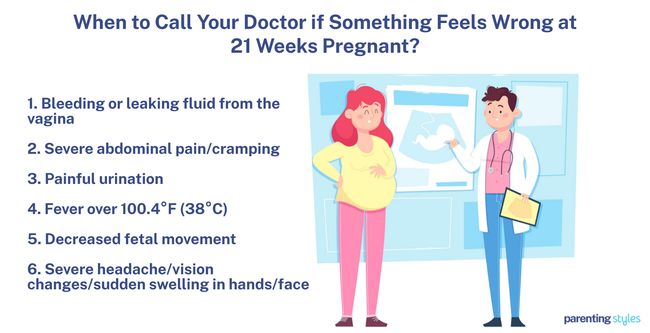
Are There Prenatal Vitamins that Need to be Taken During Week 21 of Pregnancy?
Yes, 10 essential minerals and vitamins must be taken during week 21 of pregnancy to promote optimal outcomes, according to the American College of Obstetricians and Gynecologists (ACOG). ACOG, a professional organization of doctors specializing in obstetrics and gynecology, underscores the necessity of these nutrients based on extensive research.
Calcium intake should be 1,000 milligrams for pregnant women aged 19 to 50 during week 21. This mineral is critical for building and maintaining strong bones and teeth, ensuring the mother and the developing fetus maintain healthy bone density throughout pregnancy.
Iron, at 27 milligrams, is essential during week 21 to facilitate red blood cells’ oxygen delivery to the fetus. Adequate iron levels are crucial to preventing anemia and supporting increased blood volume during pregnancy.
Iodine, at a recommended 220 micrograms, is vital for healthy brain development and thyroid function. Proper iodine levels are necessary for fetal growth and neurological development.
Choline is another essential nutrient needed at 450 milligrams. It supports the development of the fetal brain and spinal cord, aiding in neural development and helping to prevent brain and spine-related birth defects.
Vitamin A, at 770 micrograms, plays a significant role in forming healthy skin and eyesight and aiding bone growth during week 21. This vitamin supports the development of the heart, lungs, kidneys, and other organs.
Vitamin C, recommended at 85 milligrams, is important for promoting healthy gums, teeth, and bones, enhancing iron absorption, and supporting the immune system during pregnancy.
Vitamin D, at 600 international units, is crucial for building the fetus’s bones and teeth during week 21. It ensures proper calcium absorption and promotes healthy eyesight and skin.
Vitamin B6, at 1.9 milligrams, helps form red blood cells and enables the body to use protein, fat, and carbohydrates effectively. This vitamin is essential for fetal brain development and helps reduce pregnancy-related nausea.
Vitamin B12, at 2.6 micrograms, is necessary to maintain the nervous system and form red blood cells. Sufficient B12 levels support overall fetal development and help prevent certain birth defects.
Folic acid, at 400 micrograms, is recommended to prevent birth defects in the brain and spine, supporting the overall growth and development of the fetus and placenta.
ACOG advises taking only one serving of your prenatal supplement daily and not exceeding the recommended amounts to avoid deficiencies. Overconsumption of some vitamins, such as vitamin A, causes birth defects.
Consult your OB-GYN to determine the best prenatal vitamin for you.
What Does Parenting Styles Suggest About 21 Weeks Pregnant?
Parenting Styles suggests expecting mothers prioritize their health and well-being, attend all scheduled prenatal appointments, and start preparing for the baby’s arrival.
“Focus on maintaining a balanced diet, staying hydrated, and getting regular, safe exercise. Listen to your body, get adequate rest, and don’t hesitate to ask for help when needed,” suggests Pamela Li, writer, Founder, and Editor-in-Chief of Parenting Styles.
Don’t hesitate to discuss any concerns or questions with your obstetrician. Stay educated about your pregnancy’s progress and what to expect in the coming weeks.
Li continues, “While you still have energy and time, begin planning for your baby’s arrival.”
This includes preparations for setting up the nursery, creating a baby registry, taking childbirth classes, and discussing parenting strategies with your partner.
Congratulations on being 21 weeks pregnant!